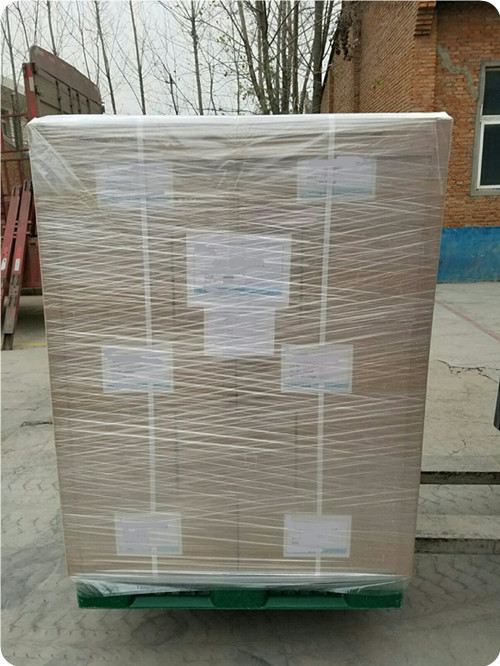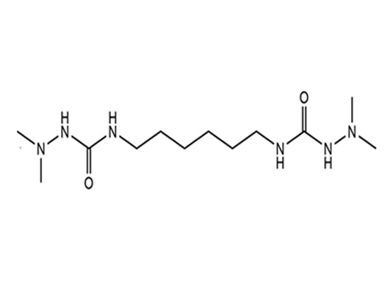YELLOW INHIBITOR HN-130
4,4-Hexamethylenebis(1,1-dimethylsemicarbazide);
1,6-Hexamethylenebis(N,N-dimethylsemicarbazide)
CAS NO.: 69938-76-7
Main Purity: ≥99%
|
4,4-Hexamethylenebis(1,1-dimethylsemicarbazide) Basic information |
|
Product Name: |
4,4-Hexamethylenebis(1,1-dimethylsemicarbazide) |
|
Synonyms: |
hydrazinecarboxamide,n,n’1,6hexanediylbis[2,2dimethyl;hydrazinecarboxamide,n,n’-1,6-hexanediylbis[2,2-dimethyl-;N,N’-1,6-hexanediyl-bis(2,2-dimethyl)-Hydrazinecarboxamide;1,6-BIS[3-(DIMETHYLAMINO)UREIDO]HEXANE;1,6-hexamethylene bis(n,n-dimethylsemicarbazide);4,4-HEXAMETHYLENEBIS(1,1-DIMETHYLSEMICARBAZIDE);Anti-yellow agent HN-130;4,4-HEXAMETHYLENEBIS(1,1-DIMETHYLSEMICARBAZIDE) EP |
|
CAS: |
|
|
MF: |
C12H28N6O2 |
|
MW: |
288.39 |
|
Mol File: |
Packing & storage: 20kg in paper box or 25kg in plastic bag lined cardboard drum; kept in cool and dry place, avoid sunlight.
Material Safety Data Sheet
Section 1 - Chemical Product
MSDS Name: Spandex Antiyellow Agent UDT
Section 2 - Composition, Information on Ingredients
CAS No.: 85095-61-0
Chemical Name: Spandex Antiyellow Agent UDT
%: 100%
Objectionable Constituents:
double(NN-dimethylhydrazine carbonyl,4- ammonia phenyl)methane
Section 3 - Hazards Identification
EMERGENCY OVERVIEW
Incursions pathway: Inhalation, ingestion, cutaneous absorption
Environmental hazards: Toxic to aquatic organisms, may cause long-term adverse effects in the aquatic environmetn.
Section 4 - First Aid Measures
Skin: Flush skin with plenty of water and soap, be sure not to use organic solvent.
Eyes: Flush eyes with plenty of water for at least 15 minutes, if eyes inflammation or irritation ,get medical aid immediately.
Inhalation: Remove from scene to fresh air immediately.If respiratory system or mucosa inflammation or irritation ,get medical aid immediately; If discomfort, get medical aid immediately;If contact time is longer, get medical aid immediately too.
Ingestion: Taken plenty of water immediately(more than 500ml,if possible, give active carbon slurry). If accompany with vomit,please let him vomit completely by himself,to prevent suffocation.Give water constantly, manual induce vomiting only by someone understand knowledge of emergency treatment. Never give anything by mouth to unconscious or comatose person,get medical aid immediately.
Ingestion: Taken plenty of water immediately(more than 500ml,if possible, give active carbon slurry). If accompany with vomit,please let him vomit completely by himself,to prevent suffocation.Give water constantly, manual induce vomiting only by someone understand knowledge of emergency treatment. Never give anything by mouth to unconscious or comatose person,get medical aid immediately.
Section 5 - Fire Fighting Measures Hazardous
Characteristics: Explosibility, Dust may form an explosive mixture with air.
Harmful combustion
products: Carbonic oxide, nitric oxide, toxic gas, smog.
Extinguishing media and extinguishant:
Water, CO2, foam, dry powder.
Fire fighting matters need
attention and measures: a) If water contaminated from fire hoses or spray gun,do not discharge waters into sewer or groundwater system, rivers and lakes.Water used by fire control must try to collect,sewage or soil must be deal with local regulations.
b) Special protective equipment for firefighters: Body covering full protective clothing, Self-contained breathing apparatus.
Section 6 - Accidental Release Measures
Emergency dispose: Power off
Personal precautions: Do not breath Vapors or dust., avoid contact with skin , eyes and clothes.
Environmental precautions: Prevent from entering sewer system, surface water or groundwater system.
Measures for cleaning up: Handle with machine and equipment. Sweep up and collect product into a suitable container, seal up, labeled, avoid making dust.
Section 7 - Handling and Storage
Handling precautions: Caution as remove and open, avoid making dust, keep away from sources of ignition. Use with adequate ventilation, no eating, drinking or smoking at work place.
Storage precautions: Far away from food and drink. Stored in original container and keep it tightly closed in a cool, dry place.Seal the cover right after use.Protect from sunshine.If the containter more than 2000L,or use inflammable organic solvent, passivation of containter or make system anti-explosion,consult professional.
Section 8 - Exposure Controls, Personal Protection
Maximum permissible concentration: China(MAC) none listed
Internally piloting: 10mg/m3 (8 hours weighted average)
Monitoring measures: Use adequate analytical instrument
Respiratory protection: Effective dust respirator
Eye protection: Appropriate glasses and masks
Body peotection: Work clothes, and tightness shoes
Hand protection: Protective gloves
Other protection: Forbid eating, drinking or smoking at work place. Avoid drinking alcoholic beverages before work, take a bath and put on clean clothes after work. Take physical examination before employment and regular.
Section 9 - Stability and Reactivity
Stability : Thermal decomposition
Conditions to Avoid: Electrostatic discharge
Incompatibilities with Other Materials: Strong acid, strong base, stong oxidant
Decomposition Products: Carbonic oxide, nitric oxide, toxic gas, smog
Section 10 - Physical and Chemical Properties
Appearance: White powder
Constitutional formula:
Section 11 - Toxicological Information
Acute toxicity: LD50 >2000mg/kg(oral, rat)
Chronic toxicity: Skin damage, degrease, dry and dermatitis.
Irritation: a)Skin, rabbit , 1000mg/24h, moderate irritation;
b)Eye ,rabbit , 4mg/24h , moderate irritation
Section 12 - Ecological Information
Ecological toxicology toxicity: NO date
Ecological degradability: NO date
Abiological degradability: NO date
Biological accumulation: NO date
Section 13 - Disposal Considerations
This product can be widely used in the production process of PU profiles, shoe materials, plastic and polyurethane fiber to prevent yellowing stain during the period of processing; This product can also be served as antioxidant and stabilizer and may participate in the polymerization; can also be used as an anti-yellowing agent of polyurethane coating.





